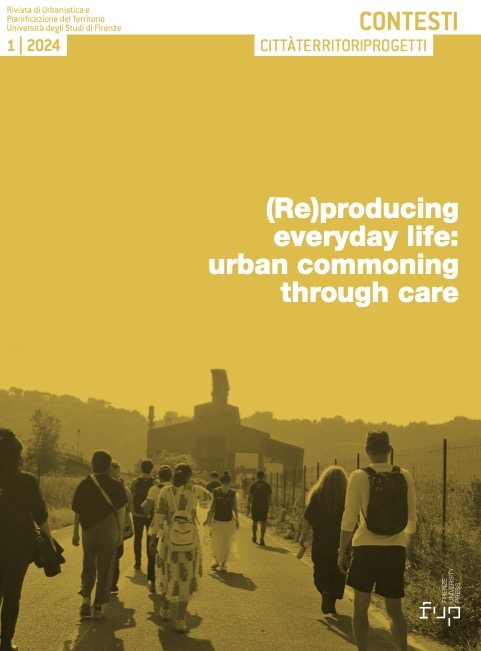Reception through Mobile Commons. Disrupting Exclusion and Negotiating Solidarity Politics through Brussels’ Squats
Published 2024-07-18
Keywords
- inequality,
- solidarity,
- proximity,
- third sector,
- covid-19 pandemic
- gift practices ...More
How to Cite
Copyright (c) 2024 Ismail Oubad

This work is licensed under a Creative Commons Attribution-NonCommercial 4.0 International License.
Funding data
-
European Research Council
Grant numbers ERC AdG 101053836
Abstract
This study investigates the complex dynamics of squatting in Brussels, examining its influence on shaping solidarity norms and practices in urban settings. Through activist-ethnography conducted within squats, we identify a recurring pattern: the (re)production and negotiation of mobile commons. Analyzing three squatting instances, we emphasize their role as not only spaces for commons (re)production but also platforms for migrants’ and activists’ social becoming. We argue that squats are not mere shelters but dynamic spaces where negotiation and social transformation occur, challenging conventional humanitarian assistance models. Ultimately, this research highlights the significance of (re)producing alternative dwelling infrastructures for illegalized migrants in shaping the urban commons and thereby impacting everyday urban politics of solidarity.
Downloads
References
- Ataç, I., Schütze, T. and Reitter, V. (2020) “Local responses in restrictive national policy contexts: welfare provisions for non-removed rejected asylum seekers in Amsterdam, Stockholm and Vienna,” Ethnic and racial studies, 43(16), pp. 115–134.
- Cañas, T. (2020) “Creating sites of resistance,” Journal of cultural analysis and social change, 5(2), p. 1- 10.
- Carling, J. and Collins, F. (2018) “Aspiration, desire and drivers of migration,” Journal of ethnic and migration studies, 44(6), pp. 909–926.
- Clarebout, A. (2020) L’hébergement citoyen en Belgique : effacement des frontières entre hébergeurs et hébergés, IRFAM. Available at: https://irfam.org/wp-content/uploads/etudes/Analyse052020.pdf (Accessed: Mars 30, 2024).
- Dadusc, D. (2019) “The micropolitics of border struggles: migrants’ squats and inhabitance as alternatives to citizenship,” Citizenship studies, 23(6), pp. 593–607.
- Davis, A. Y. (2010) Abolition Democracy: Beyond Empire, Prisons, and Torture. ReadHowYouWant.
- De Genova, N. (Ed.) (2017). The Borders of “Europe”: Autonomy of Migration, Tactics of Bordering. Duke University Press.
- De Genova, N. (2018) “The ‘migrant crisis’ as racial crisis: do Black Lives Matter in Europe?,” Ethnic and racial studies, 41(10), pp. 1765–1782.
- Debelder, J. (2020a) Les mobilisations solidaires envers les personnes migrantes : une modalité locale de la gestion des diversités pour un bénéfice partagé ?, IRFAM. Available at: https://www.irfam.org/les-mobilisations-solidaires-envers-les-personnes-migrantes/ (Accessed: April 14, 2024).
- Deleuze, G. and Guattari, F. (2013) A Thousand Plateaus: Capitaliism and Schizophrenia.
- Fassin, D. (2011) Humanitarian Reason: A Moral History of the Present. Oakland: University of California Press.
- Fians, G. (2022) “Prefigurative Politics,” Cambridge Encyclopedia of Anthropology.
- Foucault, M. (1993) Surveiller et punir: Naissance de la prison. Paris, France: Gallimard.
- Fraser, N. (1990) “Rethinking the public sphere: A contribution to the critique of actually existing democracy,” Social text, (25/26), pp. 56-80
- Khosravi, S. (no date) “Doing Migration Studies with an Accent,” Journal of Ethnic and Migration Studies, pp. 1-13.
- Lafaut, D. and Coene, G. (2019) “‘let them in!’ humanitarian work as political activism? The case of the maximiliaan refugee camp in Brussels,” Journal of immigrant & refugee studies, 17(2), pp. 185–203.
- Martinez, M. (2019) Squatters in the capitalist city: Housing, justice, and urban politics. London, England: Routledge.
- Meeus, B. and Arnaut, K. (2019) “Arrival Infrastructures: Migration and Urban Social Mobilities,” Bas. Arrival Infrastructures: Migration and Urban Social Mobilities.
- Mezzadra, S. (2010). The Gaze of Autonomy: Capitalism, Migration and Social Struggles in Squire, V. (Ed.). The Contested politics of mobility: borderzones and irregularity (1st ed.). Routledge. pp. 20–42.
- Negri, A. (1999) Insurgencies: Constituent power and the modern state. Minneapolis: University of Minnesota Press.
- Oubad, I. and Mouna, K. (2023) “Certifying Credibility: Trajectory of Sub-Saharan Asylum Seekers in Italy.” Fuori Luogo. Rivista Di Sociologia Del Territorio, Turismo, Tecnologia 17(4), pp.139-154.
- Papadopoulos, D., Stephenson, N. and Tsianos, V. (2008) Escape routes: Control and subversion in the twenty-first century. Pluto Press.
- Papadopoulos, D. and Tsianos, V. S. (2013) “After citizenship: autonomy of migration, organisational ontology and mobile commons,” Citizenship studies, 17(2), pp. 178–196.
- Porta, D. (2018) “Solidarity Mobilizations in the ‘Refugee Crisis,” in Contentious Moves. Basingstoke: Palgrave Macmillan.
- Quinlan, E. (2008) “Conspicuous invisibility: Shadowing as a data collection strategy,” Qualitative inquiry: QI, 14(8), pp. 1480–1499.
- Ravn, S. et al. (2020) “Shaping the ‘deserving refugee’: Insights from a local reception programme in Belgium,” in IMISCOE Research Series. Cham: Springer International Publishing, pp. 135–153.
- Routledge, P. (2013) “Activist ethnography and translocal solidarity,” in Khasnabish, J. J. A. (ed.) Insurgent Encounters: Transnational Activism, Ethnography, and the Political. Duke University Press, pp. 250–268.
- de Sardan, J.-P. O. (2021) La Revanche des contextes: Des mésaventures de l’ingénierie sociale en Afrique et au-delà. KARTHALA Editions.
- Swerts, T. (2021) “Politics disrupted? Collective intentionality, inaugural performativity, and institutional receptivity in undocumented migrant struggles,” Antipode, 53(2), pp. 355–378.
- Trimikliniotis, N., Parsanoglou, D. and Tsianos, V. S. (2016) “Mobile commons and/in precarious spaces: Mapping migrant struggles and social resistance,” Critical sociology, 42(7–8), pp. 1035–1049.
- Vandevoordt, R. and Verschraegen, G. (2019) “Subversive humanitarianism and its challenges: Notes on the political ambiguities of civil refugee support,” in Refugee Protection and Civil Society in Europe. Cham: Springer International Publishing, pp. 101–128.
- Vigh, H. (2009) “Motion squared: A second look at the concept of social navigation,” Anthropological theory, 9(4), pp. 419–438.
- Xiang, B. and Lindquist, J. (2014) “Migration infrastructure,” The international migration review, 48(1_suppl), pp. 122–148.

